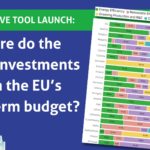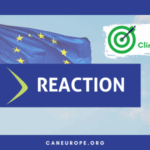Regret, not REPowerEU: EU policymakers lack conviction when it comes to Europe’s renewable energy transition
-
The agreed binding 42.5% 2030 EU renewable energy target fails to recognise the multiple crisis Europe faces
Brussels, 30th March- Early this morning, co-legislators came to a disappointing agreement on the Renewable Energy Directive (RED). Despite calls from business leaders, civil society, industry and city and citizen networks, policymakers have fallen short on ambition and voted for a binding EU 2030 renewable energy target of 42.5%, with a voluntary target of 45%. This unfortunately, does not reflect the current trilemma that hits everyone in Europe – specially the most vulnerable people – of rising energy costs, energy insecurity and the looming climate crisis.
“The ambition level shown by EU policymakers on the Renewable Energy Directive is not in line with what scientific evidence is showing us. If we are serious about reaching climate neutrality, Member States will now need to work together and surpass a 50% EU renewable energy target by 2030. This way, the EU will be contributing its fair share to limit global warming to 1.5.C. With the ‘Fit for 55’ package almost concluded, it’s of the utmost importance for higher ambition on the remaining legislative files on buildings and gas. Our future depends on them.” – Chiara Martinelli, Director at CAN Europe
Within the agreement on the RED, there is also a concession on renewable hydrogen for those who pushed hard for low carbon fuels to be included in the directive (Article 22b). By 2030, 42% of hydrogen used in industry should come from RFNBOs (renewable hydrogen and its derivatives) and 60% by 2035. However, this target can be lowered to 33.6%, but only if Member States can reach their national contribution to the overall renewable energy target by 2030 and if hydrogen produced by fossil fuels is limited to 23% by 2030. So even though this provision has potential to lower the amount of hydrogen based on fossil fuels, unfortunately, it risks facilitating hydrogen based on nuclear for example. Civil society’s Paris Agreement Compatible scenario shows Europe can be climate-neutral in 2040, with 100% renewables in all sectors, without resorting to false solutions such as nuclear energy.
New provisions on bioenergy have been added to the RED as well, but unfortunately they are far from enough to ensure bioenergy will deliver significant, near-term greenhouse gas savings compared to fossil fuels, that limited sustainable biomass resources will be optimally used in the wider economy and within the energy sector, safeguarding for biomass burning does not lead to a further increase in air pollution and biodiversity loss.
It is now up to the Member States to implement the directive with full commitment and higher ambition to enable the urgently needed renewable energy transition.
-ENDS-
Notes to the Editor:
Media Advisory: The final stand for EU’s Renewables Directive
https://caneurope.org/final-eu-renewables-directive/
Joint Letter: Last call for a Higher Renewable Energy Target
https://caneurope.org/last-call-for-higher-renewable-target
Joint letter to EU negotiators to keep the RED for renewables
Higher Ambition for Our Energy Transition
Paris Agreement Compatible (PAC) scenario: Civil-society-led energy vision aiming to construct a Europe-wide energy scenario which is aligned with the Paris Agreement’s objective to limit global warming to 1.5°C and which embodies the policy demands of civil society.
Contact: James O’Connor, Communications Coordinator at CAN Europe – james.oconnor(at)caneurope.org



